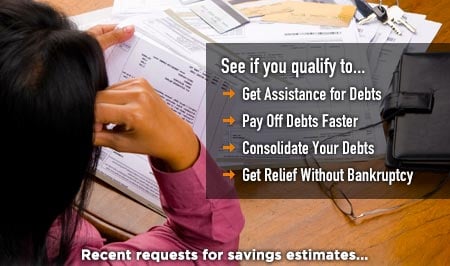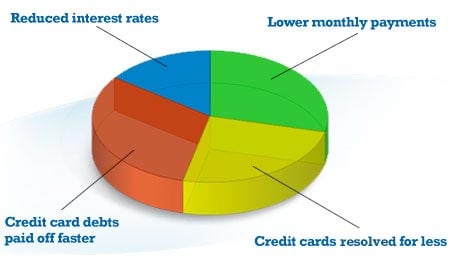
Credit Card Debt
If you are like many Tennessee residents with high credit card debt, there is some good news: You have a variety of debt relief options that could provide relief and save you a substantial amount of money through debt consolidation, debt settlement, and other proven credit card relief programs. To find out what debt relief could do for you, answer a few questions to get your free debt relief analysis and savings estimate.
How to Reduce or Eliminate Credit Card Debt
For individuals in debt and in need of credit card help, it is important to understand that there are a variety of proven debt relief options in addition to personal bankruptcy. While bankruptcy can provide relief and a fresh start, it also can have a long-lasting impact on your finances and ability to secure new credit. That's why it is smart to explore credit card debt consolidation through credit counseling debt management plans, or even a more aggressive form of credit card relief, debt settlement. Take a moment to review each of these options.
Credit Card Debt Consolidation
Debt consolidation coordinated via a credit counseling debt relief agency allows you to combine or "consolidate" all of your unsecured debts (credit cards, medical bills, store charge cards, etc.) into one easier and more manageable payment each month. The debt management plan (DMP) form of credit card relief is in reality a debt consolidation program that can help you save money and get out of debt faster by reducing your interest rates, waiving fees and penalties, and providing you with a predictable debt-free day if you follow the plan with discipline and diligence.
It is important to understand that a credit card debt relief consolidation program involves you paying back ALL the principle that you owe. However, you could save a substantial amount of money because you are typically paying back your debt at a much lower interest rate, and late fees and mounting penalties may have been removed. Since you are paying back what you originally owed, just at more favorable terms, many people consider this a more "honorable" form of credit card help or the preferred way to reduce or eliminate credit card debt.
Get a free debt relief analysis and savings estimate at no obligation.
Credit Card Debt Settlement
With more and more individuals falling behind in their bills, credit card debt settlement is becoming an increasing popular option. However, even though it is widely advertised and promoted, you should understand clearly the money-saving benefits as well as the potential drawbacks.
Credit Card Companies May "Forgive" or "Settle" Your Debt
While credit counseling, debt management, or debt consolidation involves you paying back all that you owe, just at a lower interest rate and on a timetable you can afford - debt settlement is a process by which you do not pay back all that you owe, you settle. In fact, you stop paying the credit card companies and start setting aside funds that you can use in the near future to offer a settlement amount to the credit card company. When you fall many months behind on payments, often credit card companies may decide to "sell off" your "bad debt" to a third-party collection agency for as little as ten cents on the dollar. That is why credit card companies, if you are facing financial hardship, may agree to a reasonable settlement offer made by you, or a debt settlement company on your behalf.
As appealing as credit card debt settlement may be, it also has drawbacks which should be considered before proceeding. Number one, for debt settlement to be successful (even if you reach a very large settlement) you still have to put at least something aside to make a settlement offer. Many people in debt find it hard even to put a little aside each month to offer credit card companies. Secondly, when you stop paying credit card companies according to terms of your original agreement, you run the risk of receiving threatening letters, or even being sued. Third, when you settle with a credit card company for much less than you owe, the settlement notification will typically remain on your credit report for up to 7 years. While this is not as severe and long-lasting as bankruptcy on your credit, it is still important to understand.
There is a recent positive development related to Tennessee consumers related to credit card debt settlement: New laws are in place to help protect consumers. Essentially, debt settlement companies, unless they are "attorney-based", may not charge up-front settlement fees for helping consumers. That could make debt settlement more attractive to consumers. Why? Because, unless benefits and money-saving settlements are reached - consumers will not be required to pay any settlement fees at all. "Attorney-based" settlement firms that coordinate their debt settlement programs through face-to-face meetings and disclosure with consumers still are allowed to charge up-front fees.
How to Get Out of Credit Card Debt
If you are have sky-high credit card debts that are running your life, there is some good news: You can get out of debt, and you have a variety of credit card debt solutions that can help you reduce credit card debt, or settle credit card debt. First, it is important to recognize that the best credit card relief program begins with you deciding not to continuing running up credit card debts that can take the better part of a lifetime to pay off! Second, if you truly are going through personal difficulties that make it tough for you to stay afloat financially, you can choose several options. Bankruptcy is one that now requires individuals to meet a series of qualifying standards before being approved. Fortunately, there are several credit card debt relief programs in addition to bankruptcy - including credit card and unsecured debt consolidation via credit counseling or credit card debt settlement. Regardless of the debt relief option you choose, congratulations for finally taking the steps necessary to free yourself from debt. Take a moment to answer a few simple questions in the form above to get your free debt relief analysis and savings estimate at no obligation.





















